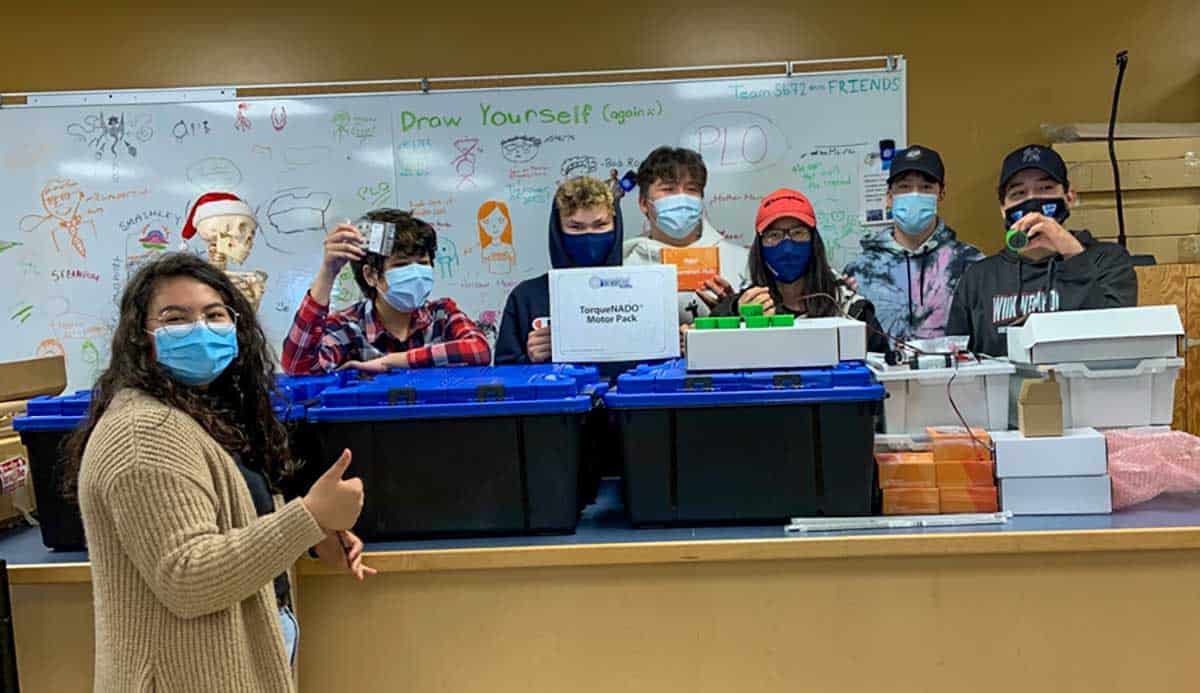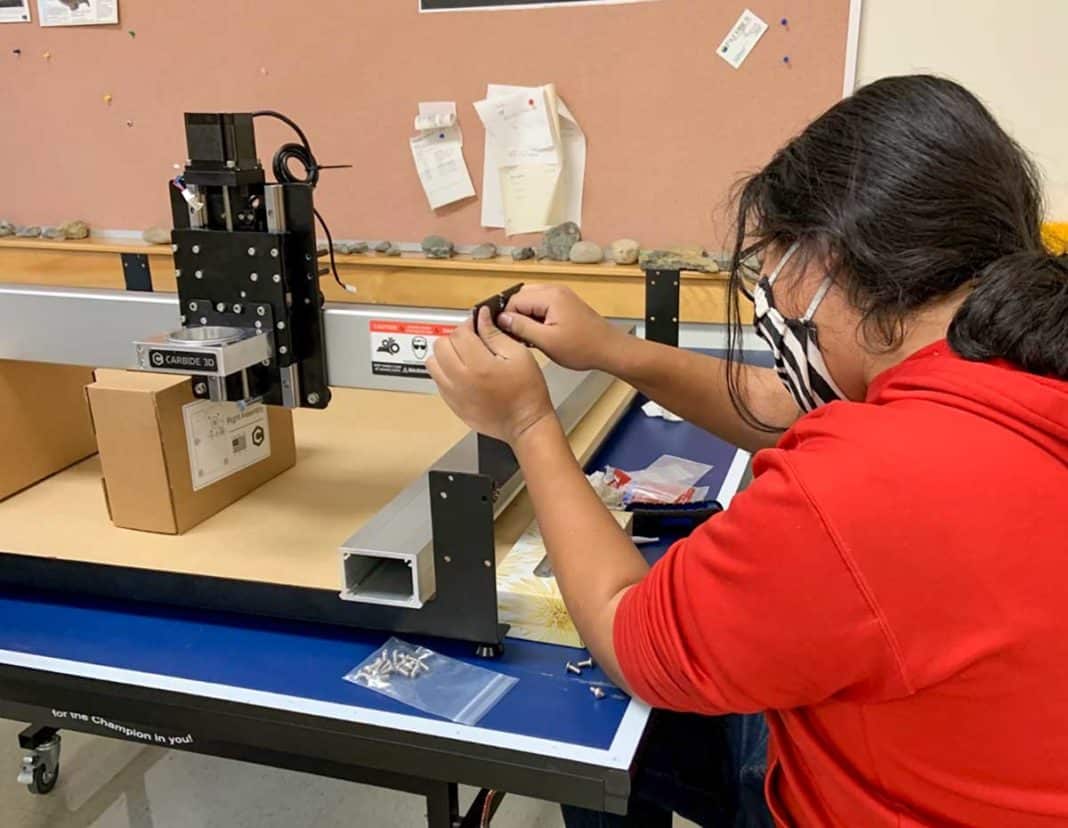MANITOULIN – The challenges of the pandemic have provided a mixed bag for Island students’ robotics teams, but most are meeting those challenges with fittingly innovative solutions.
The Wiikwemkoong High School First Robotics team were pathfinders for Island schools in the field of robotics competitions and teacher/mentor Chris Mara and his partner Margit Alberti (a teacher at Central Manitoulin Public School) have taken on roles as regional mentors for the robotics programs.
“There is no in-person competition for First Robotics Canada (FRC) this year,” said Mr. Mara, “but there are still competitions and challenges. We (Wiikwemkoong High School) have been doing a lot of skills building.”
The opportunities for the Wiikwemkoong crew are legion, with the recent additions of both a 3D printer and a CNC (computer numeric control cutting/carving) machine to their toolkits. “We are building those skill sets up,” he said.
The virtual competitions will incorporate a number of key changes to the format, besides the obvious lack of in-person interactions. Each side builds their own half of the field locally and instead of the usual three-on-three format it will be a two-on-two engagement.
But the biggest loss in the new format will be the “co-operatition” aspect, where teams are encouraged to assist each other in order to bring their best game to the table. It’s hard to lend a spanner over a digital connection.
“You don’t want to win against another team because they lacked a part or had a piece critical equipment fail,” said Mr. Mara. “You want to win with the other team bringing their best game to the table.”
As for the CMPS team’s progress, Ms. Alberti said “in some respects it is going well. The kids are excited to build a robot, but we didn’t compete in this year because it is virtual.”
Her elementary students tend to be focused on the technical aspects of the actual robot construction, noted Ms. Alberti.

The CMPS crew are somewhat hampered in the virtual competition by their equipment, being as their digital assets are Chromebooks, as opposed to full laptops. “You really don’t need a really powerful laptop,” she said, but the limitations of the cloud-based Chromebooks preclude the virtual experience.
Currently the Rainbow District School Board information technology support worker for the school is attempting to source out-dated laptops at the board that could still do service in the virtual competition. “Maybe some old teacher’s laptops can be found,” said Ms. Alberti. “They don’t have to be that powerful.”
She estimates that eight to 12 laptops would fill the bill nicely, with two to three students working together on a robot.
“You don’t really want solo efforts,” she explained, “the idea is to have students working together to solve problems.”
Charles C. McLean Public School’s Mecha Martens Lego robotics team from Gore Bay did compete virtually this year, and although they did not advance to the provincials this year, there were a number of solid accomplishments as feathers to this year’s team. “For the past few months, and especially the past few weeks, the kids put together a solid project for the competition,” said Ray Scott, coach of the Gore Bay team. “The kids found things a lot different having to work and compete online and by video (due to the pandemic) and not being able to meet in groups to work on and discuss their projects in person. They lost a lot of their synergy because of that.”
The Mecha Martens team was made up of eight students, all veterans to the C.C. McLean robotics team. They included Amara Wilson-Zegil, Athena Gravelle, Ezra Diebolt, Hailey Wadge, Henry Hartin, Maryam Aliagan, Noah Walker and Ruby Niemi.
“We’ve had a lot of success the last couple of years and the kids persevered and jumped through all the hoops and did everything they had to do to get there,” said Mr. Scott. He explained the team put together a special project that utilizes a bicycle whose rotating pedals turn the pages of a book—encouraging and promoting reading as the operator follows the story.
A Twitch presentation included a contest for the North Bay regional qualifiers, which Amara Wilson Zegil won. “Amara won the swag prizes for finishing first which was a feather in her cap,” said Mr. Scott.
Diane Debassige and Connie Kiley also run a girls’ team in M’Chigeeng, noted Ms. Alberti. “Birch Island school (Shawanosowe) has a team and Ray Scott and Bruce Lindsay do incredible work with their robot kids at C.C. McLean,” said Ms. Alberti.
“We have a lot of technical and mechanical talent on the Island already and robots can hone those skills,” she continued. “Give them an additional outlet and show some students other career opportunities to grow their skills, hobbies and interests. There are a lot of other connected avenues with the robotics programs, like marketing and creative design.”
FRC (not the Lego, but the high school robots competition) provides an enormous sum available for scholarships, said Ms. Alberti. “Over $80 million in Canada alone in 2019. It is a great way for students to help finance their post-secondary education. The scholarships are not just in engineering, but in business, economics, communications and all the other fields robotics covers.
Unfortunately, the Manitoulin Secondary School (MSS) robotics program is in a bit of a hiatus. “I have received a number of the Lego kits, but they are still unopened, and I have a tote full of material,” said Alan Davy, coach of the MSS team. “We typically only compete in the FRC and (spoiler alert) the kids don’t know I have them.”
Sadly, pandemic and budget challenges preclude the robotics program going forward this year.
“For us to participate in the FRC it typically costs around $7,500,” Mr. Davy shared. The robotics program itself requires a budget of around $15,000. “Half of which goes to enter the competition,” he said.
One of the key challenges faced by the program is the lack of large corporate sponsors on the Island, and even when off-Island groups are sought as sponsors there are other challenges. “Typically, donors don’t want to see their money going towards travel costs,” he said. “But that places teams in the North at a distinct disadvantage because most of the competitions take place in the south.”
Where other teams can day-trip to the competitions and billet overnight in their own homes, teams from Northern Ontario must factor in the cost of accommodation for their teams and its chaperones—taking a very large bite out of the budget that sponsors are typically reluctant to fund.
But with the virtual competitions, the bar can be lowered considerably. The entry line for such a budget is surprisingly low. Mr. Davy estimates it could be accomplished with as little as $1,000.
Mr. Davy recalled an incident from a couple of years ago that highlights the “co-oper-atition” aspects of the FRC events.
“When we needed a motor for our robot and didn’t have a spare, one of the female members from the Afghanistan team came over, all dressed from head to toe in a black hijab, and held out her hand with a motor in it,” he recalled. Coaches, team members, all are driven by the concept that underlies the FRC vision.
“The challenges humanity faces today are bigger than all of us,” said Mr. Davy. “We are only going to be able to meet those challenges by working together to find solutions.”
The Assiginack team is community-based, rather than in the public school, so that team was unable to come together due to the pandemic restrictions. Eyes there will also be looking to the future and being able to get back into the robotic saddle.





